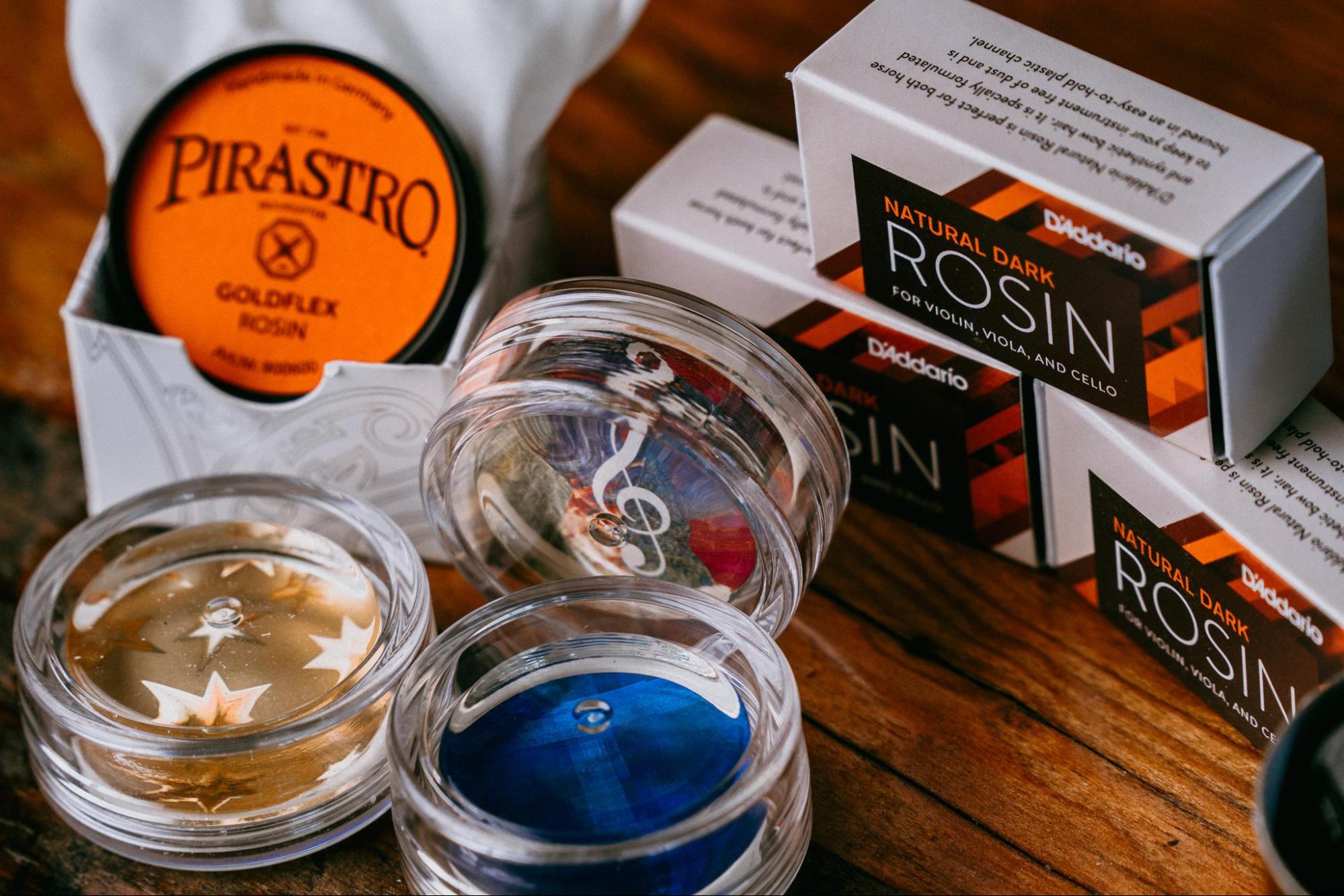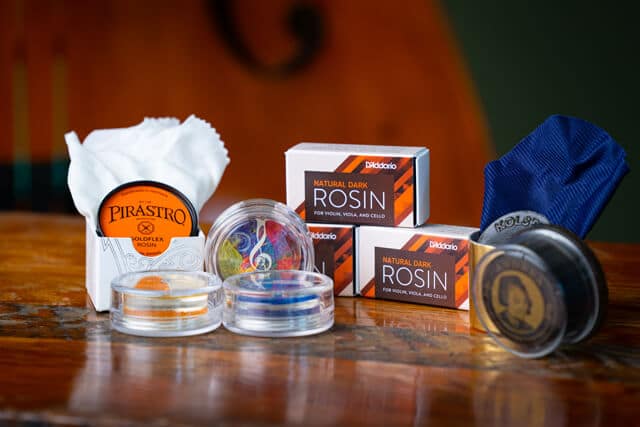What is Violin Rosin?
Violin rosin is the unsung hero of the string instruments world, whether light or dark. It is essential for every violinist, from beginners purchasing their first violin accessories to professionals looking to buy violins online. But what is violin rosin, exactly? It’s a solid form of resin derived from pines and other conifers, crucial for creating friction between the bow hair and violin strings, allowing them to vibrate and produce sound. Without rosin, the bow would glide silently over the strings, making it indispensable in every violinist’s toolkit. Whether playing a soul-stirring melody or practicing scales in your living room, the suitable rosin can significantly enhance your instrument’s voice, ensuring clarity, richness, and the perfect pitch that resonates from a well-rosined bow.
What is Violin Rosin Made Of?
At the heart of every musical string performance is violin rosin, but what concocts this pivotal accessory? Primarily, it comprises resin extracted from conifer trees, which forms the base of this essential violin accessory. This natural resin undergoes a purification process to eliminate impurities, ensuring it provides the proper grip and tone clarity.
Some rosins include additives like metals, waxes, and gums to fine-tune the friction, grip, and texture. These ingredients are meticulously blended to create rosins catering to different climates, playing styles, and string instruments. Whether you’re a novice exploring violin shop online options or a seasoned player understanding how to clean a violin, knowing your rosin’s composition can enhance your instrument’s care and performance, making every note you play resonate with intention and purity.
Why Do Violin Bows Need Rosin?

Rosin is fundamental for violin bows, but why is this sticky substance so crucial? The magic of rosin lies in its ability to create friction. Without it, a bow would glide silently over the strings, producing no sound. When applied, rosin coats the bow hairs, providing the necessary grip to catch and vibrate the strings effectively. This interaction is essential for the bow to produce rich, full sounds associated with string instruments.
The right amount of rosin can transform the music, offering clear articulation and enabling a range of dynamics and tonal expressions. Whether you’re a budding musician browsing violin accessories or an experienced player considering the best options to buy violins online, understanding the indispensable role of rosin can elevate your playing, ensuring every bow stroke articulates your musical intention with precision and warmth.
Benefits of Using Rosin on a Violin Bow
Applying violin rosin on a bow is not just a routine step; it’s a transformative act that enhances the playing experience. The primary benefit is the improvement of friction between the bow hair and the strings, allowing musicians to produce sound with ease and precision. This increased grip facilitates a richer, more nuanced sound, enabling the player to execute various dynamics and articulations, from the softest pianissimo to the most robust fortissimo.
Moreover, using lighter rosin on your bow contributes to each note’s clarity, ensuring that every piece you play delivers with crispness and purity. It also aids in the longevity of the bow hair, providing a protective layer that helps maintain its quality and functionality. Whether practicing in your home or selecting a violin at a violin shop online, understanding these benefits ensures that your instrument delivers its best performance, resonating with every bow stroke.
How Much Rosin Should You Use?

Determining the right amount of rosin on your violin bow is more art than science. The goal is to find a balance; too little and the bow will slide fruitlessly over the strings; too much and it may produce a scratchy, uneven tone. The perfect quantity ensures that the bow grips the strings effectively, allowing for smooth, resonant sound production.
A good rule of thumb is to apply enough darker rosin so that the bow feels tacky but not overly sticky, enabling it to draw out the string instrument’s full tonal range. A few swipes across the rosin cake before each practice session or performance is sufficient for most players. However, the frequency and amount can vary based on humidity, playing intensity, and personal preference. Observing how your bow reacts while playing and listening to the sound quality will guide you in applying the ideal amount of rosin for your violin bow.
How Do I Clean Rosin Off My Instrument?
Maintaining the pristine condition of your violin involves regular cleaning to remove rosin buildup, which, if neglected, can affect the instrument’s sound and aesthetic. Cleaning rosin off your violin is straightforward and essential for its upkeep. After each playing session, gently wipe the body and strings of your violin with a soft, dry cloth to remove fresh rosin dust. You can use a slightly damp cloth on the violin’s body for more stubborn accumulations, but avoid contact with the strings or varnished areas.
For a deeper clean, specialized string cleaners are available that safely remove rosin from the strings without damaging them. Remember, using products designed explicitly for violins to avoid harm is essential. Regularly cleaning your violin enhances its appearance and ensures the longevity and quality of its sound, embodying the meticulous care that string instruments require, much like the attention to detail found when you explore how to clean a violin through a reputable violin shop’s online resources.
How Often Does Your Violin Bow Need Rosin?
The frequency of rosining your violin bow is pivotal to maintaining its optimal performance. Generally, the necessity to reapply rosin depends on your playing intensity and the type used. Applying rosin every few days is a good baseline for regular players, ensuring the bow maintains sufficient grip to produce precise, resonant tones. However, if you’re practicing intensively or performing frequently, you should rosin your bow slightly more often.
A telltale sign that your bow needs rosining is when it starts slipping across the strings, producing a faint sound or no sound at all. Listening to your instrument is essential; the violin will tell you when the bow lacks the necessary traction. Remember, every stroke of the bow is a dialogue with your instrument, and keeping the right amount of rosin is vital to ensuring this conversation continues harmoniously, enhancing your musical expression and the overall playing experience.
Conclusion
Mastering violin rosin is essential in your journey as a string musician. It’s not just about applying a substance to your bow; it’s about deepening your connection with your instrument, ensuring every note played imbues clarity and emotion. The suitable rosin can elevate your performance, transforming ordinary sounds into extraordinary musical expressions.
Remember, the key to effectively utilizing rosin is understanding its purpose, applying the right amount, and maintaining your instrument’s cleanliness. Regularly tending to your bow with the appropriate rosin touch will keep your music resonant, your instrument in top condition, and your artistic expression uninhibited. Whether you’re a novice exploring the world of string instruments or a seasoned musician, embracing the nuances of violin rosin will enhance your musical journey, ensuring each bow stroke contributes to the beautiful language of music you speak.
